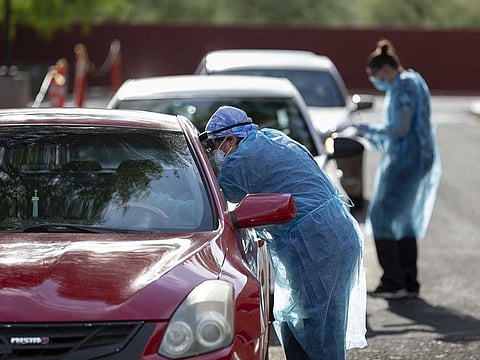COVID-19: Millions lose health insurance in US recession
Those losing coverage could face staggering costs if they are struck by the coronavirus

Washington: The coronavirus pandemic stripped an estimated 5.4 million American workers of their health insurance between February and May, a stretch in which more adults became uninsured because of job losses than have ever lost coverage in a single year, according to a new analysis.
The study, to be announced Tuesday by the nonpartisan consumer advocacy group Families USA, found that the estimated increase in uninsured workers from February to May was nearly 40% higher than the highest previous increase, which occurred during the recession of 2008 and 2009, when 3.9 million adults lost insurance.
“We knew these numbers would be big,” said Stan Dorn, who directs the group’s National Centre for Coverage Innovation and wrote the study.
“This is the worst economic downturn since World War II. It dwarfs the Great Recession. So it’s not surprising that we would also see the worst increase in the uninsured.”
Families USA is one of a number of groups trying to estimate the number of people who have lost insurance during the pandemic; definitive data will not become available until mid- to late 2021, when the federal government publishes health insurance estimates for 2020.
The analyses vary, but all reach the same grim conclusion: More people lack insurance than ever before.
The nonpartisan Kaiser Family Foundation has estimated that 27 million Americans have lost coverage in the pandemic; that study took into account family members of the insured.
Another analysis, published Monday by the Urban Institute and the Robert Wood Johnson Foundation, projected that by the end of 2020, 10.1 million people will no longer have employer-sponsored health insurance or coverage that was tied to a job they lost because of the pandemic.
Staggering costs
And those losing coverage could face staggering costs if they are struck by COVID-19, which has sent the seriously ill to hospital intensive care units for weeks, sometimes months.
The studies come in the thick of the campaign season, when health care - and in particular the future of the Affordable Care Act, popularly known as Obamacare - will be a major issue. Democrats and their presumptive presidential nominee, Joe Biden, want to expand the law. President Donald Trump has asked the Supreme Court to overturn it.
Four of every five people who have lost employer-provided health insurance during the coronavirus pandemic are eligible for free coverage through expanded Medicaid programs or government-subsidised private insurance through the Obama-era health law, according to the Kaiser Family Foundation.
But experts say that insuring the recently unemployed is a difficult challenge. Many people cannot afford premiums for coverage through either the health care law or the programme known as COBRA, for the Consolidated Omnibus Budget Reconciliation Act. Others might not know they are eligible for Medicaid.
The White House and Congress have done little to help. The Trump administration has imposed sharp cuts on the funding for outreach programmes that assist people in signing up for coverage under the health law. And while House Democrats have passed legislation intended to help people to keep their health insurance, the bill is stuck in the Republican-controlled Senate.
Reimburse hospitals
Rather than expand access to subsidised insurance under the Affordable Care Act, Trump has promised to directly reimburse hospitals for the care of coronavirus patients who have lost their insurance. But there is little evidence that has begun.
“Helping people keep their insurance through a public health crisis surprisingly has not gotten much attention,” said Larry Levitt, executive vice president for health policy at the Kaiser Family Foundation. “This is the first recession in which the ACA is there as a safety net, but it’s an imperfect safety net.”
The Families USA study is a state-by-state examination of the effects of the pandemic on laid-off adults younger than 65, the age at which Americans become eligible for Medicare. It found that nearly half - 46% - of the coverage losses from the pandemic came in five states: California, Texas, Florida, New York and North Carolina.
In Texas alone, the number of uninsured jumped from about 4.3 million to nearly 4.9 million; 3 out of every 10 Texans are uninsured, the research found. In the 37 states that expanded Medicaid under the Affordable Care Act, 23% of laid-off workers became uninsured; the percentage was nearly double that - 43% - in the 13 states that did not expand Medicaid, which include Texas, Florida and North Carolina.
Five states have experienced increases in the number of uninsured adults that exceed 40%, the analysis found. In Massachusetts, the number nearly doubled, rising by 93% - a figure Dorn attributed to a large number of people losing employer-based coverage there. Across the country as a whole, more than 1 in 7 adults - 16% - is now uninsured, the analysis found.
To generate the estimates, Dorn examined the number of laid-off workers in each state and calculated how many had become uninsured based on coverage patterns since 2014, when the central provisions of the Affordable Care Act went into effect. The underlying data for those patterns comes from work published by the Urban Institute in April.
Although analysts will have a clearer picture of the actual figures next year, Dorn said, “policymakers need to know now what the approximate magnitude is of insurance losses to decide what they need to do. So this is our best estimate for what the actual coverage losses have been.”
Sign up for the Daily Briefing
Get the latest news and updates straight to your inbox








